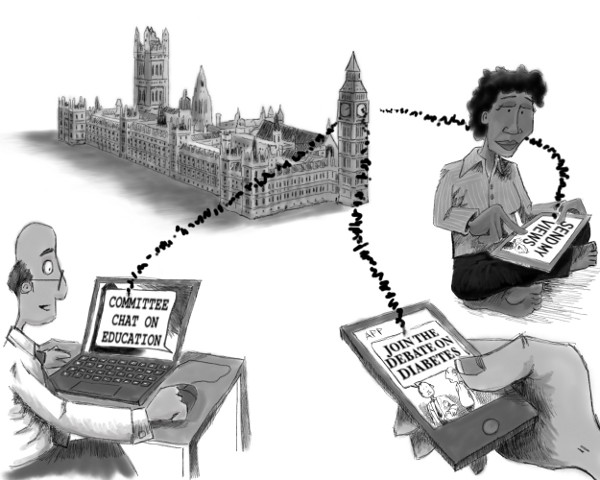8 Ensuring that the public have a good experience of engaging with Parliament
It is important that when Parliament experiments with different ways of engaging the public, the opportunities are genuine and have the support of MPs. As the Hansard Society said, “if Parliament stimulates public interest and participation in a process, it has a responsibility to be responsive to that interest.”[1]
If people have a good experience of engagement, it will help to build their trust.[2] But if they have a less than satisfactory experience, it could put them off contacting their MP or engaging with the House of Commons in future. It could also have a wider negative effect on their views of MPs and Parliament.[3] As our student forum on engagement said, “it is important that the citizens feel heard by their MPs and local representatives. If they feel that their engagement makes a difference they will be more inclined to engage.”[4] For some people, feeling listened to will be enough to give them a positive experience:
“Citizens need to know that showing up matters, even if the result doesn’t go your way, showing up does mean being heard.”[5]
For others, this will not be enough. When someone contacts their MP or signs a petition, they usually want an action or decision to be taken as a result. A participant at one of our workshops described their expectations:
“It is about getting your views heard but then there’s the actions required afterwards which are just as important. You get your views heard but then often you just see them dissipated. We want to be able to see that our efforts have results.”[6]
If people do not get the outcome they were hoping for, they may be disappointed or frustrated by the process.[7] Researchers from Bournemouth University have identified a feeling among some citizens that “many consultation exercises are hollow and in actuality there is no-one interested in their opinions.”[8] This is likely to be more damaging than not encouraging people to get involved in the first place. However, it is not realistic to expect that every time someone takes part in the political process they will be able to get the outcome they want, as there will inevitably be many different views, which are not all compatible. Parliament needs to be clear about how people’s voices will feed into the process.

8.1 Using digital tools to engage with Parliament
In section 11 below, we look at the possibilities for using digital tools for increasing engagement. However, we are mindful of this perceptive warning from Involve:
“Let the purpose, not the tools, be the driver. As with any effort to improve citizen engagement (whether digital or offline) it is critical to clarify the purpose first and then find the right tools to achieve it…the essential first step is to determine *why* citizen voice is desired within a particular process, and what citizens add that actors already in the process don’t already bring.”[9]
One possibility is the use of online forums, but we were warned that it is not easy to use these with large-scale public consultations. For example, some experts said that although technology is “excellent at gathering information”, it is still not very good at large-scale deliberation.[10] One person said that public forums “can be a mess”, and suggested that it was better for the public to contact their MP if they wanted to comment on proposed legislation.[11]
One way to get around this is to factor in “substantial human activity” to support the process, for example by moderating online discussions and analysing the contributions received. [12] But the resource implications of this would place a limit on how many large-scale forums could be offered. Another route is to enable those who take part to manage the process themselves, debating ideas and voting on or rating the best ones, so that the most popular are given greater prominence:
“If tens or hundreds of thousands of citizens want to contribute different views, it isn't possible for legislators to read and digest all the comments. The online fora must facilitate citizens debating with each other, so that the views that attract greatest consensus are promoted and these are the ones fed back to legislators.”[13]
We are confident that online participation by the public in the work of Parliament will be increasingly important, but we have deliberately set out a cautious approach to this, at least initially, to avoid early experiments being crushed by the weight of expectations. However, we expect there to be a need in the relatively near future for Parliament to build or better still adapt existing tools to support large-scale online participation.
[3]David Babbs, Spoken contributions on engagement, 15 June 2014, Qs 52-62; Response 570696341 to online questions on engagement and facilitating dialogue; Response 65761201 to online questions on representation;
[4]Student forum summary on engagement
[5]Digital Democracy event in Cardiff and Gov Camp Cymru, 26-27 September 2014
[6]Digi089b [Britain Thinks and Hansard Society summary of workshop ‘A listening Parliament?’]
[7]Digi063 [University College London]; Digi086 Dr Cristian Vaccari, Department of Politics and International Relations, Royal Holloway, University of London
[8]Digi050 Media School Researchers, Bournemouth University
[10]Digi014 [Professor Chris Reed];Dr Andy Williamson, spoken contribution on representation, 17.06.14, Q23
[12]Digi014 [Professor Chris Reed]
[13]Digi016 [Mark D. Ryan and Gurchetan S. Grewal, University of Birmingham]
